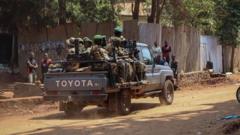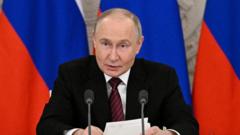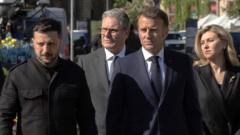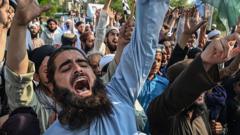The Democratic Republic of Congo has agreed to a ceasefire with Rwandan-backed M23 rebels as negotiations in Qatar gain traction. This comes amidst escalating violence in the region, leaving thousands dead since January, and aims to pave the way for further peace discussions.
Ceasefire Agreement Reached Between DR Congo and M23 Rebels in Qatar Talks

Ceasefire Agreement Reached Between DR Congo and M23 Rebels in Qatar Talks
A significant truce follows a week of negotiations as fighting intensifies in eastern DR Congo.
The Democratic Republic of Congo (DRC) and the Rwandan-backed M23 rebels have come to a ceasefire agreement amid ongoing peace talks in Qatar. This development signals a crucial pause in hostilities that have ravaged eastern DR Congo, resulting in approximately 7,000 casualties since the beginning of the year.
After over a week of "frank and constructive" discussions, both parties issued a joint statement expressing their commitment to uphold peace. Last month, during an unexpected meeting in Doha, Congolese President Félix Tshisekedi and Rwandan President Paul Kagame had previously reiterated their commitment to an "unconditional" ceasefire.
The conflict has escalated dramatically since January, with M23 undertaking an aggressive military offensive, capturing Goma and Bukavu, which are eastern Congo's largest cities. This expansion of violence has sparked concerns about a potential regional conflict.
While DRC has accused Rwanda of providing military support to M23, including arming the rebels, Rwanda has denied these allegations, insisting its military actions are defensive against Congolese forces and militias linked to the 1994 Rwandan genocide. DRC has also raised concerns over what it claims is Rwanda's illegal extraction of its mineral resources in the eastern regions, which Rwanda refutes.
In their shared statement, both M23 and the DRC government have pledged to refrain from hate speech and intimidation while calling on local communities to uphold the ceasefire. They affirmed their commitment to halt all fighting "throughout the duration of the talks and until their conclusion."
Reports from the Qatar negotiations indicated that the agreement was nearly jeopardized due to technical issues, leading to uncertainty about the durability of the truce as previous ceasefires agreed since 2021 have often faltered. Belgium's Foreign Affairs Minister Maxime Prevot remarked that the ceasefire could serve as a "crucial step towards ending the violence." Qatar's mediation comes after M23's refusal to attend discussions in Angola last month. Previously, DRC had been resistant to direct talks with M23, labeling the group as "terrorists."
As peace efforts continue, the international community will be closely monitoring the developments in this volatile region to gauge the potential for long-lasting stability.
After over a week of "frank and constructive" discussions, both parties issued a joint statement expressing their commitment to uphold peace. Last month, during an unexpected meeting in Doha, Congolese President Félix Tshisekedi and Rwandan President Paul Kagame had previously reiterated their commitment to an "unconditional" ceasefire.
The conflict has escalated dramatically since January, with M23 undertaking an aggressive military offensive, capturing Goma and Bukavu, which are eastern Congo's largest cities. This expansion of violence has sparked concerns about a potential regional conflict.
While DRC has accused Rwanda of providing military support to M23, including arming the rebels, Rwanda has denied these allegations, insisting its military actions are defensive against Congolese forces and militias linked to the 1994 Rwandan genocide. DRC has also raised concerns over what it claims is Rwanda's illegal extraction of its mineral resources in the eastern regions, which Rwanda refutes.
In their shared statement, both M23 and the DRC government have pledged to refrain from hate speech and intimidation while calling on local communities to uphold the ceasefire. They affirmed their commitment to halt all fighting "throughout the duration of the talks and until their conclusion."
Reports from the Qatar negotiations indicated that the agreement was nearly jeopardized due to technical issues, leading to uncertainty about the durability of the truce as previous ceasefires agreed since 2021 have often faltered. Belgium's Foreign Affairs Minister Maxime Prevot remarked that the ceasefire could serve as a "crucial step towards ending the violence." Qatar's mediation comes after M23's refusal to attend discussions in Angola last month. Previously, DRC had been resistant to direct talks with M23, labeling the group as "terrorists."
As peace efforts continue, the international community will be closely monitoring the developments in this volatile region to gauge the potential for long-lasting stability.



















